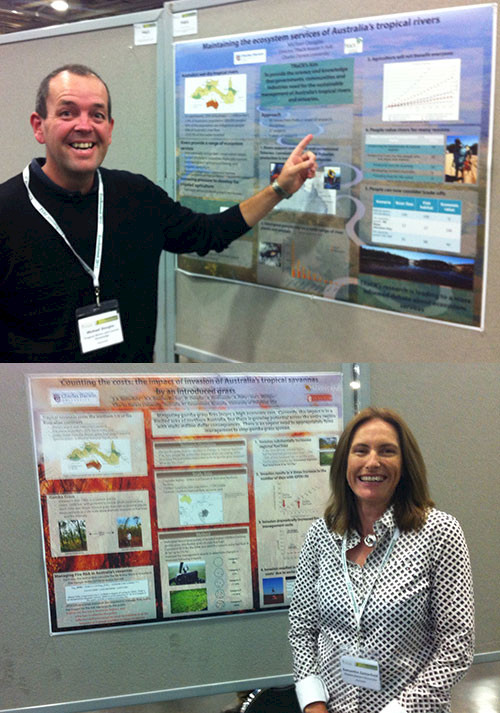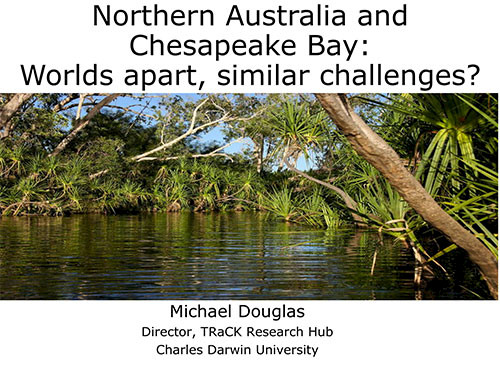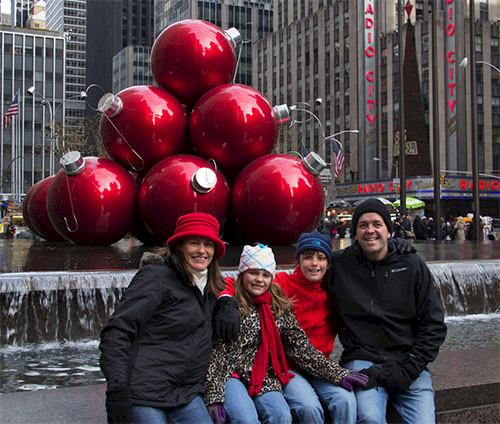Establishing a Darwin-IAN approach: Charles Darwin University and the Integration and Application Network
Bill Dennison ·We said good-bye to Drs. Michael Douglas (‘Dougo’) and Samantha Setterfield (‘Sam’) from Charles Darwin University in Darwin, Northern Territory, Australia last week. Dougo and Sam joined the Integration and Application Network in August 2012 as part of their sabbatical. Dougo was in the U.S. as a Fulbright Scholar and he and Sam spent a couple of months at Oregon State University before coming to Maryland.
While in Maryland, the primary interaction that we had with Dougo and Sam was developing a paper on aligning people, projects and pathways to improve the application of ecological research. Dougo and Sam read extensively and developed an excellent reading list of recent publications calling for ‘actionable research’, ‘transdisciplinary science’, or one of the many names that applied science is known as. They analyzed the recent scientific literature and discerned distinct trends in various key words. Phases of scientific applications were created that coincided with the publication record that include conservation, environmental, sustainability and resilience science. Various attributes of system complexity, disciplinarity, engagement and collaboration were identified, as well as various personal traits needed for effective science application. The science process of engaging stakeholders through outreach programs vs. the social process of engaging scientists to address certain issues was contrasted. A partnership model of research outcomes linking with societal outcomes was formulated by aligned the right people with the right projects using the right pathways.
Dougo and Sam attended the EcoSummit in Columbus, Ohio using posters produced by Brianne Walsh from the Integration and Application Network. Dougo gave seminars at Horn Point Laboratory, the National Socio-Environmental Synthesis Center (SESYNC), Chesapeake Bay Program (Scientific and Technical Analysis and Reporting team meeting) which is part of the IAN Seminar Series, as a plenary speaker at the Within Our Reach conference in Corvallis, Oregon and at the Cary Institute of Ecosystem Studies in New York.


Dougo and Sam’s sabbatical with IAN was part of our efforts to develop a Charles Darwin University collaboration with the University of Maryland Center for Environmental Science. For example, Charles Darwin University and IAN have a joint project, funded through the Fulbright Program of the U.S. State Department, with the goal of educating and informing responsible stewardship of water resources between U.S. and Australian students through an interactive virtual partnership. In addition, we are exploring ways to partner with Dougo and Sam in the next version of their Tropical Rivers and Coastal Knowledge research hub.
This ongoing collaboration between Charles Darwin University and IAN has led us to the ‘Darwin-IAN’ label. The Merriam-Webster dictionary definition of ‘Darwinian’ is 1. of or relating to Charles Darwin and 2. of, relating to, or being a competitive environment or situation in which only the fittest persons or organizations prosper. As for definition 1., our shared respect of Charles Darwin the scientist and great science communicator is manifested in the naming of Charles Darwin University and the inclusion of Darwin in examples of paradigm shifts by science communicators (Dennison, 2008; Environmental problem solving in coastal ecosystems: A paradigm shift to sustainability; Estuarine, Coastal and Shelf Science 77: 185-196). As for definition 2., the thriving enterprises that Charles Darwin University and the Integration and Application Network within the University of Maryland Center for Environmental Science represent within the competitive nature of academia is testament to the ‘survival of the fittest’.

About the author
Bill Dennison

Dr. Bill Dennison is a Professor of Marine Science and Vice President for Science Application at the University of Maryland Center for Environmental Science.

